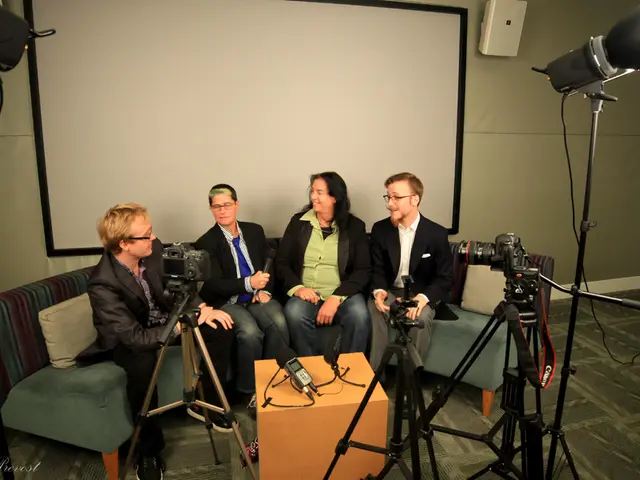Unconventional Strategies to Boost Productivity for Individuals with ADHD
Managing Attention Deficit Hyperactivity Disorder (ADHD) can present unique challenges when it comes to organizing, remembering tasks, and maintaining focus. According to Dr. Russell Barkley, a renowned expert in the field, people with ADHD often struggle with executing tasks rather than knowing what to do. This is described as a 'blindness to the future.'
Traditional productivity tips, such as 'just write a list,' might not be effective for those with ADHD, due to their brains' unique characteristics. Here are some reasons that conventional advice may fall short:
- The 'Now vs. Not Now' predicament: Life for someone with ADHD can be divided into 'now' and 'not now.' Future rewards don't seem tangible, causing tasks without immediate consequences to be postponed.
- The craving for stimulation and novelty: The ADHD brain is drawn to stimulating and new experiences. Tasks that are dull or repetitive fail to offer the necessary dopamine release, making it difficult to sustain attention.
- Memory and organizational issues: ADHD often involves poor prospective memory (remembering to do things later) and weak organizational habits. Without external cues or structures, good intentions can become lost in the chaos.
- Decision overload: Decision fatigue affects those with ADHD severely, as constantly deciding when, where, and how to perform tasks depletes mental energy. A suggestion like "plan your day every morning" may backfire due to the overwhelming number of choices and the resulting feeling of being overwhelmed.
To address these challenges, it's essential to employ productivity strategies tailored to the ADHD brain. Some of these unconventional tactics, backed by real-life testimonials, are:
- Silly Song Hack: Assign tasks a catchy, memorable song, and keep singing it until the task is completed.
- Create Your Vibe: Customize your workspace to match your mood, fostering an atmosphere that arouses energy or tranquility.
- The Dedicated Spot Solution: Assign each item a designated home, such as a "slipper box" or "key bowl," ensuring items stay organized and in their place.
- In-your-face Reminders: Place reminders in inconvenient spots to ensure you see them whenever you need to complete a task.
- Tavern Time Cleaning: Play medieval tavern music and imagine you're tidying an inn to bring an element of fun and distraction to mundane tasks.
- Don't Sit: Resist the urge to sit down immediately after arriving home, and instead begin your evening tasks with your favorite upbeat music.
- The Tutorial Method: Pretend you are filming a tutorial while completing mundane tasks, transforming chores into performances or missions.
- Five-Minute Frenzy: Set a timer for five minutes and race against the clock to complete as many tasks as possible, creating a pressure-filled, exciting set-up for productivity.
- Productive Side-Tasks: Take on small, useful tasks during moments when procrastination creeps in, such as scheduling appointments or doing chores while avoiding the primary task.
- Annoyance Tactic: Purposely make your environment uncomfortable, such as playing slightly annoying music or using bright overhead lights, to motivate yourself to move and complete tasks.
These alternative strategies aim to cater to the unique needs of individuals with ADHD, providing tools that accommodate their cognitive differences. When faced with the challenges associated with ADHD, it's essential to look beyond traditional productivity tips and explore approaches that address the underlying mechanisms impacting memory, organization, and focus.
- The challenges of managing ADHD, especially organizing tasks, remembering, and focusing, might not be addressed by traditional productivity methods due to the unique characteristics of the ADHD brain.
- The ADHD mind is often divided into 'now' and 'not now,' making it difficult to prioritize tasks that don't have immediate consequences.
- Memory and organizational issues are common in individuals with ADHD, making good intentions hard to follow without external cues or structures.
- Decision overload can affect those with ADHD severely, making it challenging to plan and focus on tasks due to decision fatigue.
- To address these challenges, unconventional productivity strategies such as the "Silly Song Hack," creating a customized workspace, placing reminders in inconvenient spots, or playing medieval tavern music might be more effective for people with ADHD.
- By using music, imagery, or role-playing in productivity tasks, individuals with ADHD can find a sense of motivation and focus that traditional methods might lack.
- Implementing these strategies can help cater to the unique cognitive differences of individuals with ADHD, ultimately improving their health-and-wellness and mental-health outcomes, as well as promoting personal-growth and education-and-self-development.








